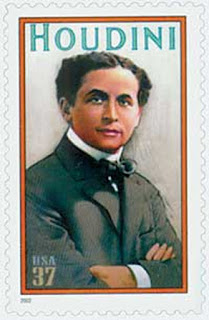Harry Houdini, born on 24 March 1874, was a
Hungarian-American escape artist, illusionist, and stunt performer known for
his sensational escape acts. His 1904 challenge with the Daily Mirror's special
handcuffs and several Hollywood films are among his well-known acts.
Born in Budapest, he arrived in the United States with his family in 1878. He
took on various jobs as a child, including performing as a trapeze artist.
Houdini began his magic career in 1891 without initial success, but his
fortunes changed after meeting manager Martin Beck who advised him to focus on
escape acts.
Houdini's parents were Rabbi Mayer Sámuel Weisz and Cecília Steiner. After
emigrating to the United States, the Weisz family changed their name to the
German spelling Weiss. They lived in Appleton, Wisconsin, and then, after
financial struggles, moved to New York City. Houdini's public debut was as
"Ehrich, the Prince of the Air" at nine years old, and he was a
champion cross country runner in his youth.
As a magician, Houdini adopted the stage name "Harry Houdini" after
French magician Robert-Houdin and possibly American magician Harry Kellar.
His brother Theodore Hardeen also pursued a career in escape acts.
Houdini became famous during European tours, challenging police to contain him
and successfully suing those who claimed his acts were fake. He married
Wilhelmina Beatrice "Bess" Rahner, who became his stage assistant.
Houdini took on various roles beyond escapology; he acted in movies, briefly
ran his own film production company, and wrote books refuting spiritualism and
fraudulent mediums. He also served as the president of the Society of American
Magicians, devoted to maintaining professional standards and debunking frauds
in the magician community.
Houdini's notable escape acts included the Daily Mirror handcuff challenge, the
Milk Can Escape, the Chinese water torture cell, and the suspended straitjacket
escape. He wrote "The Unmasking of Robert-Houdin" criticizing his
former idol and "A Magician Among the Spirits" confronting
spiritualist frauds. His voice was recorded on Edison wax cylinders in 1914.
Houdini vehemently defended his methods and sued for slander when challenged.
He was a Freemason and bought a townhouse in Harlem. Late in life, he suffered
a fatal blow to his abdomen by Jocelyn Gordon Whitehead. Houdini was
hospitalized and died of peritonitis in October of 1926.
Afterward, his estate, effects, and memorabilia were inherited by his brother
and later obtained by collectors including David Copperfield. Attempts to
communicate with Houdini after death through séances, as per a pact between him
and his wife, were unsuccessful.





No comments:
Post a Comment